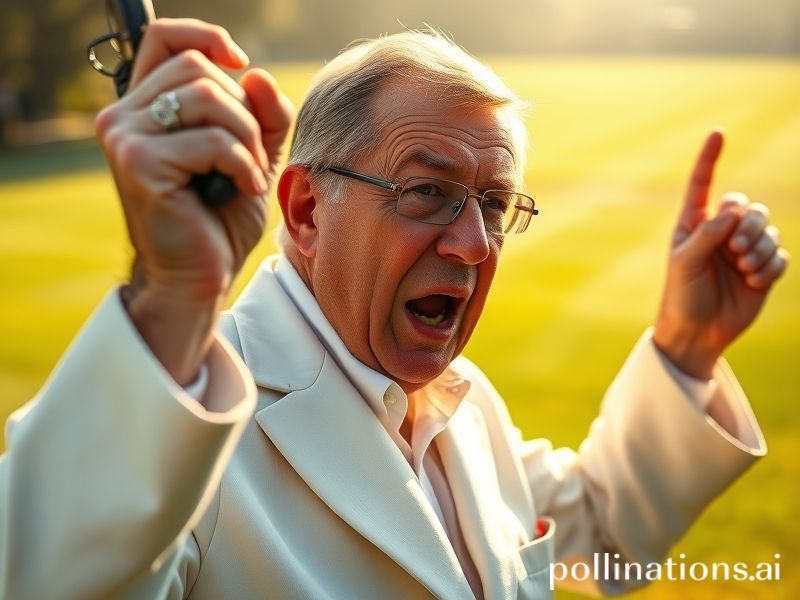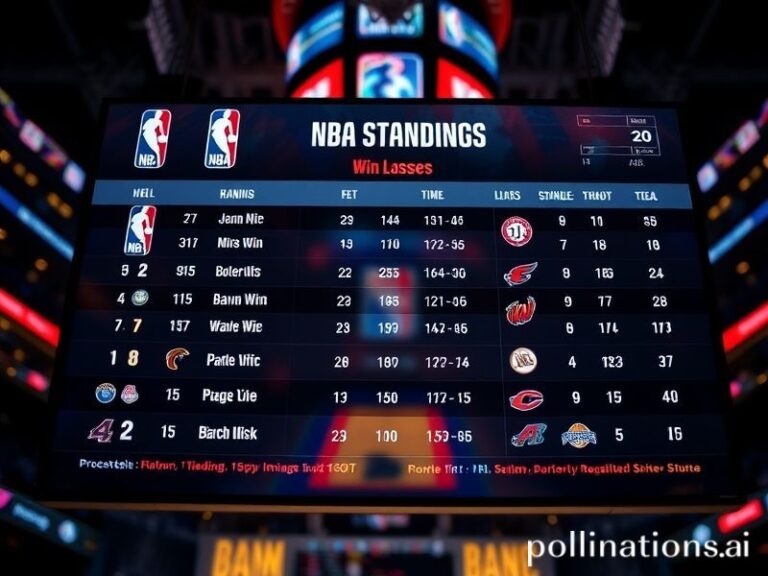How a Yorkshire Umpire Named Dickie Bird Became the Planet’s Accidental Diplomat
The Dickie Bird Doctrine: How a Tiny Cricketing Whisperer Became a Global Metaphor for Soft Power
When the news filtered out of Sheffield last week that Dickie Bird—octogenarian umpire, Yorkshire icon, and the only man alive who can make silence sound like a sermon—had been hospitalized, the collective gasp was audible from Lord’s to Lahore. Social media lit up in six alphabets, #GetWellDickie trended ahead of #UkrainePeaceTalks, and a Vietnamese cricket account posted a grainy 1992 clip of Bird giving Javed Miandad a grandfatherly finger-wag for excessive appealing. In that moment, it became clear that “dickie bird” is no longer merely rhyming slang for “word” or the nickname of a bespectacled ump with an accent thick as treacle. It is a diplomatic asset—soft power in white coat and Panama hat.
Naturally, the British Council immediately pivoted. Within hours, its cultural attachés were drafting grant proposals for “The Dickie Bird Fellowship for Ethical Governance,” a program that will fly minor-league umpires from Sierra Leone to Leeds to learn the subtle art of calling a wide without starting a coup. Meanwhile, the Foreign Office—ever alert to a nostalgia bandwagon—leaked (on background, naturally) a memo suggesting that a knighthood for services to Anglo-Subcontinental relations might be “timely.” Nothing mends a fraying Commonwealth like a shared childhood memory of a tiny man folding his arms and shaking his head at a Pakistani fast bowler.
Across the Atlantic, the State Department watched with envy. America has no equivalent folk deity: its closest might be an NBA referee, but try exporting Joey Crawford’s technical-foul theatrics to rural Bangladesh and see how that plays. So the U.S. pivoted to tech. Silicon Valley start-up “UmpireChain” announced seed funding for an AI that replicates Bird’s moral intuition—code-named Project Dickie—which will supposedly adjudicate everything from World Trade Organization disputes to whose turn it is to buy the next round in Prague. Early beta testers report the algorithm keeps muttering “that’s just not cricket” and recommending tea breaks.
China, never one to miss a soft-power vacuum, responded with trademark ruthlessness. By Friday, the China Cricket Association—founded in 2014 and boasting 17 players—had filed to register “Dikki Byrd” for a line of smart stumps that tweet in Confucian aphorisms. The move triggered a frantic WIPO filing from the ECB, a stern op-ed in The Hindu, and a passive-aggressive emoji from the ICC. Somewhere in Beijing, a strategist is already scripting a Belt & Road exhibition match in Urumqi featuring holograms of Bird and Sun Tzu discussing the LBW law.
The global south, meanwhile, embraced the moment with pragmatic affection. Kenya’s cricket Twitter reminisced about 2003 when Bird, commentating for the BBC, called Collins Obuya’s leg-spin “bloody marvellous, luv,” instantly boosting Nairobi’s street-cricket economy by 400%. In Guyana, rum shops replayed 1996 footage of Bird sprinting to apologize to Brian Lara after a marginal caught-behind call, using it as a tutorial in post-colonial etiquette. And in Afghanistan, where cricket is less sport than nation-building exercise, Rashid Khan posted a selfie in a vintage Bird-era wide-brim hat captioned “Umpire of peace.” The Taliban account liked it within minutes—proof that soft power sometimes travels faster than hard spin.
All of which raises the uncomfortable question: why does a stooped, Yorkshire-accented relic command more international respect than most sitting heads of state? Perhaps because in an era of deepfakes, drone strikes, and diplomatic ghosting, the image of a lone man standing unflinching while 50,000 people howl at him is reassuring. There is clarity in his creed: you’re in or you’re out, over or not over, and no algorithm can bribe him.
By Monday, Bird was reportedly sitting up in bed demanding “proper Yorkshire tea, none of that herbal muck,” which the hospital kitchen interpreted as a UN Security Council resolution. World markets rallied. The Kremlin offered a Tula samovar. Sri Lanka promised Ceylon’s finest. Even the French dispatched a case of Lapsang, though they labeled it “thé pour messieurs du sport anglais” to save face.
Conclusion: In the grand scoreboard of geopolitics, nations rise and fall on trade balances and terror indices, but influence still hinges on shared stories. Dickie Bird—keeper of the crease and the collective conscience—has become one such story. Long after the last Hawk-Eye calibration, the planet will remember the little man who stood mid-pitch, raised a single finger, and made the world shut up for a second. And if that isn’t a diplomatic triumph, nothing is.







